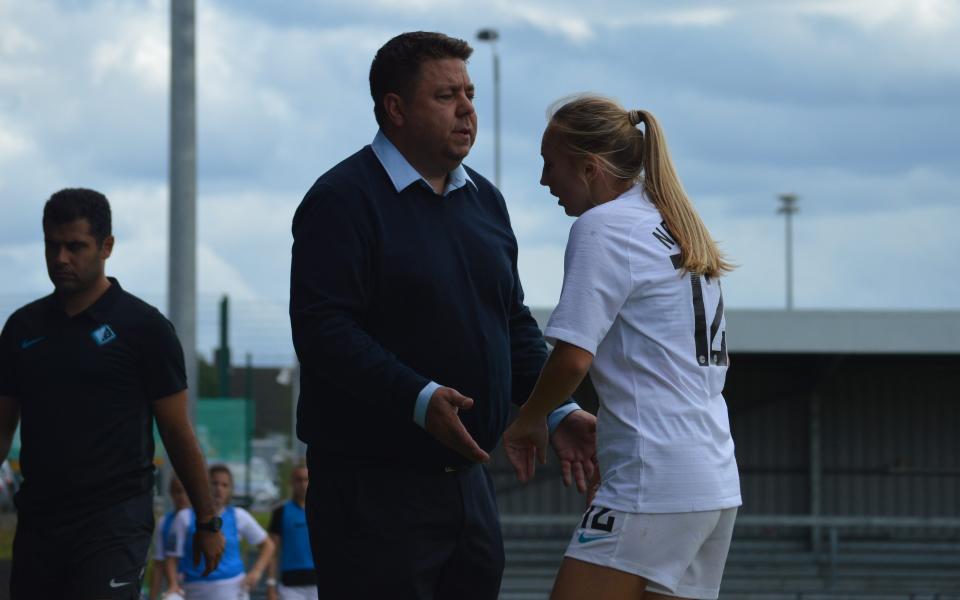'We're not just the annoying sisters of men's clubs': London City Lionesses want to create blueprint for women's football

Players at newly-formed Women’s Championship outfit London City Lionesses will have unprecedented access to private medical insurance as part of a wider ambition to create a blueprint for women’s football and show that female sides are not “the annoying sisters” of men’s clubs.
London City Lionesses were unveiled as a new professional team in the second tier of women’s football towards the end of last season when the senior management board of Millwall Lionesses decided to breakaway from Millwall.
The club showed glimpses of their full-time status with a 2-0 away victory over London Bees in front of a crowd of 412 people on Sunday. Their professional set-up has been made possible through a sponsorship arrangement with SETL, a London based financial technology company, meaning they are the only full-time team in the part-time Women’s Championship this season, although Aston Villa are understood to have taken on several full-time players.
London City Lionesses’ independent entity reflects a markedly different approach to the Women’s Super League (WSL) where teams have become increasingly affiliated with their male counterparts in recent years and could feature in double-headers alongside Premier League fixtures this season.
“We want to show people that the time is now right that a women’s football club can be a women’s football club and doesn’t have to be - and I use this term whether it’s politically correct or not - the annoying sister of a men’s club,” said manager Chris Phillips, the former head coach of Millwall Lionesses.
“If you speak to about 80% of clubs out there, they’re not happy with the relationship with the men’s team.”

The club’s common denominator with any men’s football team extends to The Princes Park Stadium in Kent, where they will share the 4,100 capacity ground with National League South outfit Dartford FC, some 20 miles out of the capital.
Its partnership with SETL has been made possible owing to the fact that the co-founder of the company, Anthony Culligan, is the husband of the club's chair Diane Culligan, who took over as the unpaid chair of Millwall Lionesses in July 2018. This agreement was previously in place during the 2018-19 season, when the club’s financial problems were widely publicised. Ongoing discussions are taking place with a number of commercial partners to attract further investment and the club has procured a sponsorship deal with Nike, although details about players’ salaries remain undisclosed.
Manchester United were the first professional outfit to feature in the Women’s Championship last year but, following their promotion to the WSL, this season the league is set to be the most competitive. Women’s football clubs are not required to provide private health insurance to players, even in the professional WSL, where the Professional Footballers’ Association has funded surgery for players in the past. The FA, however, has introduced extra regulations for the 2019-20 season to ensure all WSL clubs have medical funds in place to cover injuries to their players.
“I said [in the board meeting] ‘I can’t have a player who’s injured and waiting six months on the NHS to receive an MRI [scan] and then another six months for surgery.’ We’ve lost a player for a year there,” said Phillips, who believes The FA should negotiate a deal to provide private health insurance to all clubs across the top two tiers of women’s football.
“We’ve worked hard to take out special policies to make sure we get immediate MRIs for the girls, immediate surgeries, but it is the right thing to do. We can’t keep banging on about equality for women’s football without putting our money where our mouths are.”

The bulk of the club’s squad are previous players from Millwall Lionesses, which finished bottom of the championship last season. But the allure of the club’s professional set-up - which includes a club nutritionist, psychologist and a strength and conditioning coach - has attracted youngsters such as 20-year-old Poppy Wilson, who switched from WSL side Bristol City.
A full-time training schedule also means most of the squad have dropped former jobs, such as Kallie Balfour, 26, who previously worked full-time in finance. “After a game on Sunday, I'd have to get up the next day at six in the morning,” said the forward. "It was a good career, but I wasn’t really enjoying it."
"Since I've come here, I don't think I've been happier, waking up in the morning and coming for training. For me it's been refreshing, it’s not been a problem for me, changing what I am doing."
Phillips, who spent over eight years coaching female youth teams at Arsenal where he mentored a host of current England players including Leah Williamson, is keen to mirror the set-up adopted by Manchester City when they rebranded in 2014.
“Rome wasn’t built in a day, it is going to take us time, and we are all adapting players and staff but we are all excited,” he said. “These are the standards for professional women’s football.”

 Yahoo Sport
Yahoo Sport 





































